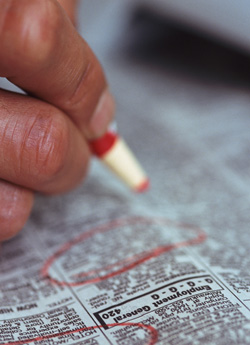Feb. 18, 2009 –  Law students, with minimal legal experience on their resumes, face a recessionary job market. But there is reason to believe students and unemployed lawyers could find prospects brighter in Wisconsin, according to career experts.
Law students, with minimal legal experience on their resumes, face a recessionary job market. But there is reason to believe students and unemployed lawyers could find prospects brighter in Wisconsin, according to career experts.
Wisconsin is not New York – and that’s a good thing for lawyers looking for work.
“Hiring in Wisconsin has always been conservative and stable so if you are reading the blogs about the national scene with the big layoffs at prominent firms and stories about job offers rescinded, that’s not really reflective of what’s going on here,” said Erin Binns, assistant director for career planning at Marquette University Law School.
Law students, with minimal legal experience on their resumes, may be the proverbial canaries in the coal mine for the profession. So far, Wisconsin law schools are not reporting serious setbacks in their graduates’ job searches.
Of course, it may be too early to tell, school officials cautioned. “Most hiring occurs in spring and this semester is just underway,” Binns said.
But, Binns added, firms that typically hire through the law school appear ready to come back this year. Firms are also expected to return in force to the University of Wisconsin, according to Nilesh Patel, career advisor at the law school.
This is not to say that nothing has changed. Patel said that firms recruiting on campus may not hire as many students as in past years. Signs of a pull back were evident at the end of 2008. “This fall, large law firms were very conservative in their hiring of second-year students for summer internships because they are assuming business will be slow in 2009,” said Jane Heymann, assistant dean for career services at U.W. Law School.
The recession’s impact on smaller firms that are not interviewing on campus but comprise a large sector of the legal services market is also harder to gauge, the schools report.
“Small law firms tend not to begin recruiting for new hires on any predictable schedule, and usually don't hire more than a few months in advance of the time they want a new lawyer to begin working, so we will not be able to assess the effect of the recession on small firm hiring until later this spring,” Heymann said. “A lot also depends on what geographical region you are talking about.”
Anecdotal reporting is the chief data so far. Schools do not begin collecting numbers tracking 2008 graduates’ efforts to find work until December and January to account for those who cannot confirm employment until they receive bar exam results in September and October, said Binns.
Hunt smarter
Binns and Patel said that job seekers need to be more flexible and creative than before.
“The federal government is the one doing the hiring,” Patel said. “I tell the students to look there even if nobody came to law school wanting to be a Social Security attorney.”
Patel said that agencies handling the federal money to rescue banks need more lawyers to keep up with regulations and if Congress approves the federal stimulus spending on roads and bridges, the Department of Transportation is going to need administrative help.
Also, Patel said, many federal agencies are self-contained entities with legal departments to handle litigation different from their primary focus. For example, he said the Internal Revenue Service has attorneys to handle employee lawsuits.
Focus on the skills, not the title. “Holding out for on-point substantive experience isn’t practical in a competitive market,” Binns, writing for the February issue of ABA Student Lawyer magazine, warns. “Look for positions that will develop fundamental and transferable skills.”
If a paying legal job is not immediately available, Patel suggested a lawyer consider volunteering services to a judge or a local Legal Aid office. He pointed out that more people are filing for bankruptcy and a lawyer might assist pro bono for the experience. “If you have never done a bankruptcy, take a CLE class,” Patel said.
“A gap in employment is easier to explain if you have been working in alternative ways,” Patel advises.
Don’t be a stranger. In addition to the extra skills that can transform an unemployed lawyer from a square peg into one of the round persuasion, CLE is a great occasion to network with other attorneys. “Find out about other opportunities,” Patel said. “Put your name out there and meet lawyers in your interest areas.”
“Most opportunities aren’t posted, and those that are tend to attract a lot of applicants, which makes them hyper competitive,” Binns notes in her ABA column. “You need to put a face and personality to your job search. People are more inclined to help and hire individuals they know and like.”
Alex De Grand is the legal writer for the State Bar of Wisconsin.
